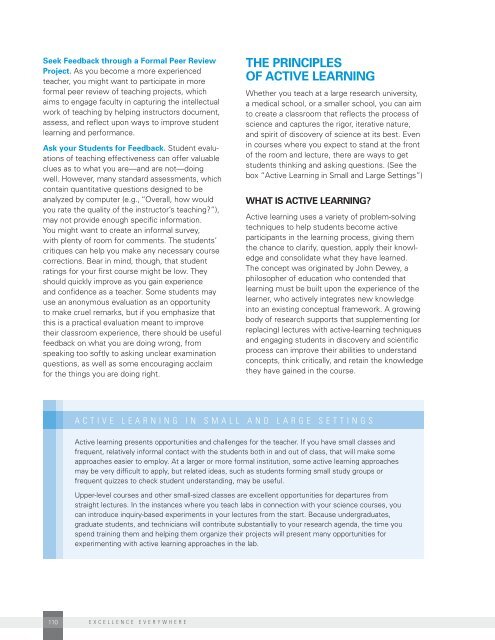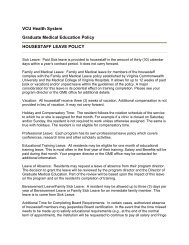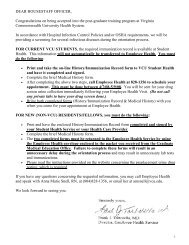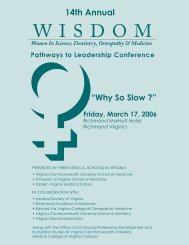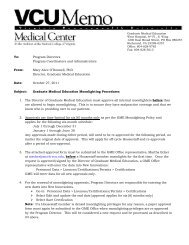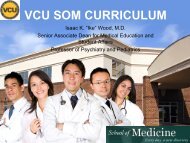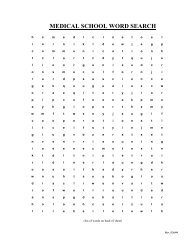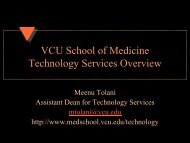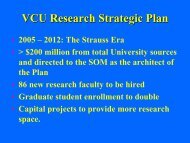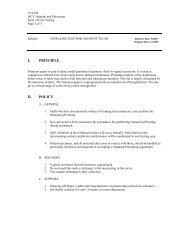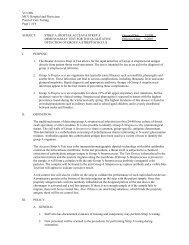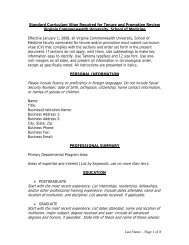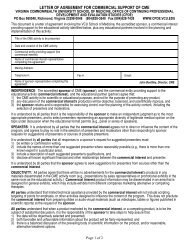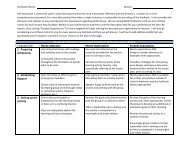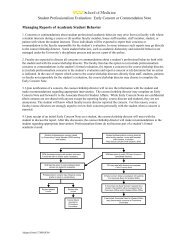Excellence Everywhere - National University of Ireland, Galway
Excellence Everywhere - National University of Ireland, Galway
Excellence Everywhere - National University of Ireland, Galway
- No tags were found...
Create successful ePaper yourself
Turn your PDF publications into a flip-book with our unique Google optimized e-Paper software.
Seek Feedback through a Formal Peer ReviewProject. As you become a more experiencedteacher, you might want to participate in moreformal peer review <strong>of</strong> teaching projects, whichaims to engage faculty in capturing the intellectualwork <strong>of</strong> teaching by helping instructors document,assess, and reflect upon ways to improve studentlearning and performance.Ask your Students for Feedback. Student evaluations<strong>of</strong> teaching effectiveness can <strong>of</strong>fer valuableclues as to what you are—and are not—doingwell. However, many standard assessments, whichcontain quantitative questions designed to beanalyzed by computer (e.g., “Overall, how wouldyou rate the quality <strong>of</strong> the instructor’s teaching?”),may not provide enough specific information.You might want to create an informal survey,with plenty <strong>of</strong> room for comments. The students’critiques can help you make any necessary coursecorrections. Bear in mind, though, that studentratings for your first course might be low. Theyshould quickly improve as you gain experienceand confidence as a teacher. Some students mayuse an anonymous evaluation as an opportunityto make cruel remarks, but if you emphasize thatthis is a practical evaluation meant to improvetheir classroom experience, there should be usefulfeedback on what you are doing wrong, fromspeaking too s<strong>of</strong>tly to asking unclear examinationquestions, as well as some encouraging acclaimfor the things you are doing right.THE PRINCIPLESOF ACTIVE LEARNINGWhether you teach at a large research university,a medical school, or a smaller school, you can aimto create a classroom that reflects the process <strong>of</strong>science and captures the rigor, iterative nature,and spirit <strong>of</strong> discovery <strong>of</strong> science at its best. Evenin courses where you expect to stand at the front<strong>of</strong> the room and lecture, there are ways to getstudents thinking and asking questions. (See thebox “Active Learning in Small and Large Settings”)What Is Active Learning?Active learning uses a variety <strong>of</strong> problem-solvingtechniques to help students become activeparticipants in the learning process, giving themthe chance to clarify, question, apply their knowledgeand consolidate what they have learned.The concept was originated by John Dewey, aphilosopher <strong>of</strong> education who contended thatlearning must be built upon the experience <strong>of</strong> thelearner, who actively integrates new knowledgeinto an existing conceptual framework. A growingbody <strong>of</strong> research supports that supplementing (orreplacing) lectures with active-learning techniquesand engaging students in discovery and scientificprocess can improve their abilities to understandconcepts, think critically, and retain the knowledgethey have gained in the course.Active Learning in Small and Large SettingsActive learning presents opportunities and challenges for the teacher. If you have small classes andfrequent, relatively informal contact with the students both in and out <strong>of</strong> class, that will make someapproaches easier to employ. At a larger or more formal institution, some active learning approachesmay be very difficult to apply, but related ideas, such as students forming small study groups orfrequent quizzes to check student understanding, may be useful.Upper-level courses and other small-sized classes are excellent opportunities for departures fromstraight lectures. In the instances where you teach labs in connection with your science courses, youcan introduce inquiry-based experiments in your lectures from the start. Because undergraduates,graduate students, and technicians will contribute substantially to your research agenda, the time youspend training them and helping them organize their projects will present many opportunities forexperimenting with active learning approaches in the lab.110 excellence everywhere


